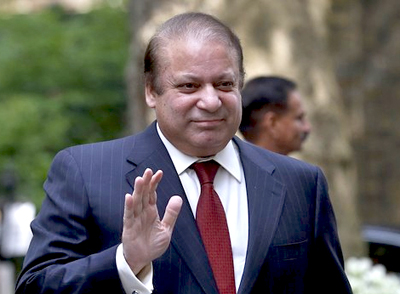 New Delhi, May 26: Pakistan Prime Minister Nawaz Sharif arrived in Delhi on Monday to attend Narendra Modi's swearing in as India's new Prime Minister, a historic first being seen as a step towards revitalizing ties that have been strained since last year. "I am carrying a message of peace. Dialogue is the only solution," he told reporters before leaving Lahore.
New Delhi, May 26: Pakistan Prime Minister Nawaz Sharif arrived in Delhi on Monday to attend Narendra Modi's swearing in as India's new Prime Minister, a historic first being seen as a step towards revitalizing ties that have been strained since last year. "I am carrying a message of peace. Dialogue is the only solution," he told reporters before leaving Lahore.
Mr Sharif, 64, is among six South Asian leaders invited for the swearing-in, unprecedented for any Indian prime minister's inauguration.
General Pervez Musharraf was the last Pakistani head of state to visit India in 2005.
Mr Sharif, who began his third term as prime minister last June after years of exile in Saudi Arabia, met outgoing PM Manmohan Singh last September on the sidelines of a UN meet in New York.
Today, Mr Sharif's only engagement is the evening ceremony.
Mr Modi will meet the Pakistan prime minister tomorrow as part a series of bilateral meetings. Officials say the meeting will be an ice-breaker more than anything, to set the tone for a dialogue.
The offer of a meeting with Mr Modi is said to be a major factor in clinching Mr Sharif's visit, which was reportedly opposed by some in Pakistan's security establishment.
Peace moves between the two countries were derailed last year after a series of ceasefire violations that escalated with the killing of five Indian soldiers in a Pakistani ambush in August last. In January, a jawan was beheaded by Pakistan soldiers.
During his campaign, Mr Modi had lashed out at the Congress for engaging with Pakistan despite the killings. "The heads of our soldiers are cut, but then their prime minister is fed chicken biryani," he sneered at one rally.
Mr Modi's invitation to Mr Sharif has been sharply criticized by the BJP's oldest ally, Shiv Sena, which believes India must not resume peace talks, cultural and cricketing ties with Pakistan unless violence along the border stops. Sena chief Uddhav Thackeray, however, said he would attend the swearing in even though it was "difficult to trust Pakistan."
The BJP's massive mandate - the party seized 282 seats on its own - means that it has room to act without pressure from its allies.
Also read: Sri Lankan President Rajapaksa arrives for Modi's swearing-in





Comments
Add new comment